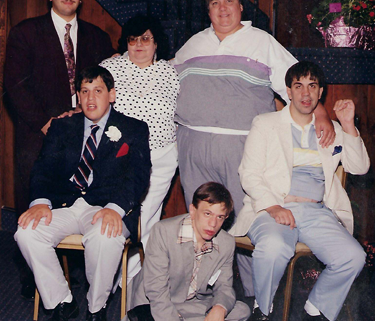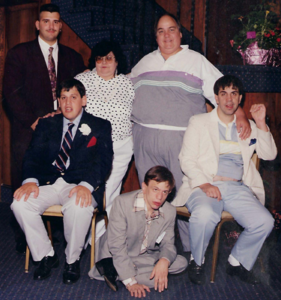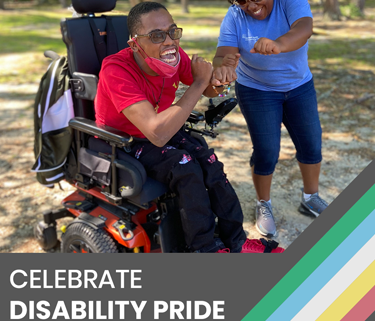Disability is a part of the rich tapestry of human diversity, and something that nearly all of us will experience at some point in our lives. It’s also a significant identity that defines how we experience the world. Yet people with disabilities have been marginalized and misunderstood for generations. All disabilities and their intersecting identities should be acknowledged, valued, and respected, and one way to do that is during Disability Pride Month.
Disability Pride Month is celebrated every July and is an opportunity to honor the history, achievements, experiences, and struggles of the disability community.
Why July? It marks the anniversary of the Americans with Disabilities Act, landmark legislation that broke down barriers to inclusion in society. But barriers still exist, which is why we need to honor every kind of disability, the people who identify with them, and the wide range of supports they need to thrive. Here’s more about the history of Disability Pride Month and the story behind the flag.
Looking for ways to celebrate Disability Pride Month? We’ve got you covered.
Learn
The History of Disability Rights in the United States
The Diversity of Disabilities
Although society often thinks of people with disabilities as a single population, it’s actually a diverse group of people with a wide range of needs. Get an overview of the different types of intellectual and developmental disabilities (IDD).
Meet People With IDD
All people with disabilities, including those with IDD, have hopes and dreams just like everyone else – such as social inclusion and employment. Watch and read their stories on The Arc’s story hub.
Share Your Disability Story or Help Someone Share Theirs
Disability Pride Month is a spotlight on what disability pride means and what people with disabilities are proud of. If you feel comfortable and safe to do so, share your story on social media and include the hashtags #DisabilityPride and #DisabilityPrideMonth.
If you have a friend, family member, coworker, or neighbor with a disability, encourage them to share their story. We want as many people to join the conversation as possible! Share stories on social media using #DisabilityPride and #DisabilityPrideMonth or even reach out to your local news. Be sure to join The Arc’s celebration by following us on social media @TheArcUS and engaging with stories from the people we serve.
Take Action
Reach Out to Your Elected Officials
One of the most important ways you can get involved in the disability rights movement is by educating your elected officials about policies that harm and strengthen the quality of life of people with disabilities. Make sure you bookmark The Arc’s Action Center for timely alerts!
Donate to The Arc
For nearly 75 years, The Arc has been at the forefront of positive change in disability rights, and we’re not slowing down! Donate to join our grassroots movement that is creating policy, programs, and possibilities for people with IDD.
Show Your Pride
Get our new, limited edition “Disabled and Proud” T-shirt and show your support for people with disabilities.
Teach Your Kids to Acknowledge and Include Disabled People
Talking to your kids about disability is an important and ongoing conversation that will help foster inclusion for the next generation. To find age-appropriate tips, read these articles from TODAY.com, HuffPost, and Cincinnati Children’s.
Attend a Disability Pride Month Event in Your Area
Show pride for your disability and/or help uplift others in your community by attending a Disability Pride event! There isn’t a database for Disability Pride Month events (yet!), but below are a few coming up in major cities.
Hire People With Disabilities
Our society’s long history of discrimination against people with disabilities continues to translate to their unemployment and underemployment. Right now, 85% of people with IDD are unemployed. Many of them want to work and have skills to contribute. Among those who are employed, people with IDD are working fewer than 13 hours a week on average and less than one-fifth of them are getting workplace benefits. But research shows that disability inclusion is a proven good business decision. It increases overall productivity, offers a window into an untapped market, and boosts bottom lines. Learn more about why and how you should hire people with disabilities in featuring The Arc and by reading stories from employees and their employers.
There are many other ways you can celebrate Disability Pride Month, and we hope this list gives you a good starting point. Thank you for doing your part to amplify the voices and experiences of people with disabilities!




 Since then, Roy Jr. and Glenn have both passed away. While both lived at home until their passing, they suffered at the hands of an underfunded system of care. Despite these losses and challenges, Roy has remained steadfast in his commitment to keeping his middle son, Michael, in his own home all his life.
Since then, Roy Jr. and Glenn have both passed away. While both lived at home until their passing, they suffered at the hands of an underfunded system of care. Despite these losses and challenges, Roy has remained steadfast in his commitment to keeping his middle son, Michael, in his own home all his life.






